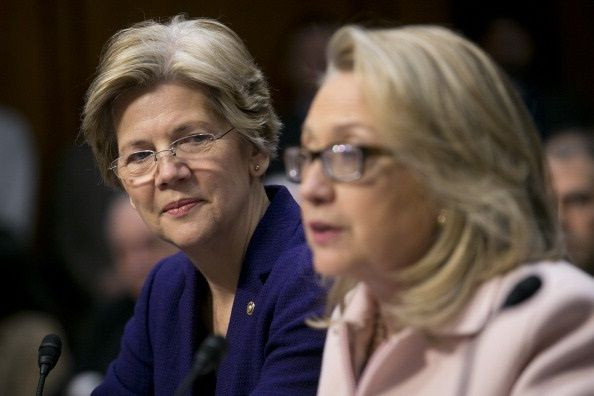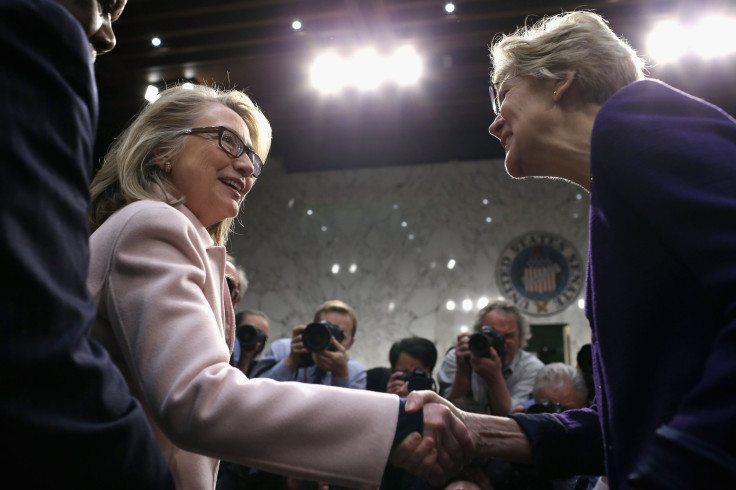Elizabeth Warren As Hillary Clinton’s VP? Sexism Makes Two-Woman Ticket A Risk

If politics were a game show, the consolation prize for Bernie Sanders supporters now that Hillary Clinton has become the presumptive Democratic presidential nominee would be for Clinton to name Massachusetts Sen. Elizabeth Warren her vice presidential pick. But the move would not be without risks.
While picking Warren as a running mate would certainly appease many progressives in the Democratic party still dejected over Sanders' apparent defeat in the primary, a ticket with two women could further open the door to another kind of division, one along gender lines. Aside from the sexism the pair would likely face from critics and potentially their opponents, their biggest challenge might be that many voters still shy away from voting for a woman.
"The U.S. lags in this department. Many countries have already elected women as heads of state," said Debbie Walsh, the director of the Center for American Women in Politics. "The gatekeepers who decide who is going to run and groom candidates are likely to be men and are likely to groom candidates that look like them."
Walsh argues that Americans are "ready to pull the lever" for a female candidate, and polls certainly suggest that Americans’ attitudes toward electing women into office have changed drastically over the past few decades. According to yearly Gallup polls, in the 1970s, the amount of American voters who claimed they would be willing to vote for a woman was still hovering around just 50 percent but has since climbed to about 90 percent. A CNN/ORC International poll in March found that 80 percent of likely voters said they thought America was “ready” for a female president, including 83 percent of men.

That poll reveals a telling disparity, however. While 83 percent of men said they thought the country was ready for a woman president, only 76 percent of women agreed. It's as if some female voters know something the male voters do not — perhaps, for instance, that the bias to answer a poll question politically correctly does not eliminate the influence of sexism and gender bias in the voting booth.
FiveThirtyEight found that Gallup poll responses of Americans’ willingness to vote for a female president dipped in the aftermath of 9/11 and the advent of the War on Terror, concluding that many Americans still felt more comfortable with a man at the helm during wartime. Consider that when the poll question becomes “how important is it” to elect a female president this election cycle, the numbers change. The CNN/ORC poll found that just 31 percent of voters said it was important for a woman to be elected in their lifetimes.
Another problem is that while in theory voters might be willing to vote for a woman, the sexism female candidates face, both overtly and more subtly, can make running a successful campaign more difficult. Take for instance the recent controversy over the price of one of Clinton’s outfits, or the longtime focus on her hairstyles and her speaking volume.
"I don't want to say that there is not bias," Walsh said. "You see it in the stereotypes around women candidates. You see it in the coverage."
The statistics for women in office across the U.S. are sobering. Less than a fifth of the seats in the U.S. Senate and the House are held by women, as are less than a quarter of state executive, state legislature, state representative and mayoral offices across the country.

While Clinton will face these challenges with or without Warren, a ticket with two women could compound the problem. One recent Fox News poll showed Clinton’s support from men in a general election as low as 33 percent. President Barack Obama, by contrast, won 44 percent of the male vote in 2012.
A 2008 study suggests that when two minorities are paired together, people instinctively start to stereotype them instead of viewing them as individuals. That's why a Clinton-Warren ticket could lend false validation to accusations from Trump that Clinton's popularity stems solely from her status as a woman — the infamous "Woman Card."
Running mates are traditionally meant to balance a ticket's weakness. While that usually means a VP pick from a battleground state or from a different geographical or ideological camp from the name at the top of the ticket, it could be smart for Clinton to turn to a male VP to help close the gender gap. Warren herself has expressed doubts that she would be the best option in terms of electability in the general election.
It's not all bleak for female politicians. The good news is that if a Clinton-Warren ticket can turn out high numbers of black, women and Latino voters, how America's white XY chromosomes cast their ballots might not matter. Obama was elected in 2008 and re-elected in 2012 without a majority of the male vote, instead leaning on a growing number of young and minority voters.
"No one who is reluctant to stereotype Hillary Clinton is going to be more or less likely to do so because she nominated Warren," said Jennifer Lawless, director of the Women & Politics Institute at American University in Washington. "Every headline is already going to note that she is the first female candidate."
Warren's accomplishments and policy views could also sway voters. She is among the most prominent progressive lawmakers in Congress and has been one of the most effective critics of Trump in the country via timely Twitter rants and scathing speeches — an asset that would be welcome on the Clinton campaign trail.
Clinton tweeted at Trump on Thursday, "Delete your account," internet parlance for "Get lost," perhaps signaling that Warren's confrontational rhetoric could be part of a winning ticket.
© Copyright IBTimes 2024. All rights reserved.






















